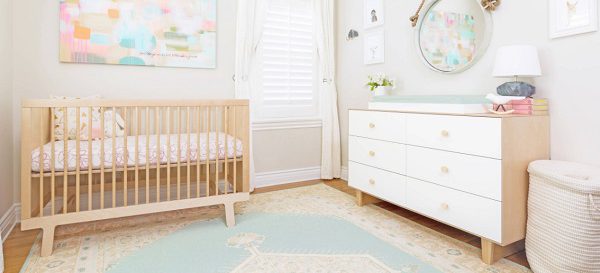It’s a wonderful time in your life, as a special new addition is coming to you or a loved one by birth, adoption, or other means. Congratulations! But in preparing for their arrival, you might find yourself asking: what is organic bedding and does it matter for your baby? It can be overwhelming with all the choices available both in stores and online, some using this buzzword and some not. Well, worry not! Today we’re going over the difference between organic and non-organic bedding and the possible benefits it may have for your baby.

What’s Organic and What’s Not
“Organic” is a shorthand word to help you look for a specific type of thing within a larger selection, like “gluten-free” in the grocery store. In terms of baby bedding, this tends to mean what material the fabric is made of or what chemicals it’s processed with and dyed using. Cotton, bamboo, and hemp are examples of materials used in organic fabric. The point of this distinction is that they’re derived more naturally from plants and fibers than other materials like polyester, standard cotton, and nylon. Theoretically, this makes the bedding made with these better than non-organic counterparts. However, not everything labeled as “organic” actually is due to complex regulation rules involving how to define the word and what companies can claim it. Always do your research before buying from organic brands, at the very least for the peace of mind in knowing you made an informed choice.
Why Organic?

I just mentioned chemicals treating your bedding, and it’s easy for parents to worry about potential toxins—usually flame-retardant materials—used to make conventional baby supplies because of how quickly the modern world developed. There isn’t time to process all the changes to baby supplies in the last fifty years, especially if you haven’t had to think about kids until now. Fewer dyes are used in organic bedding, making them not as bright but less irritable with prolonged touch. Switching to this type of baby supplies may be an easy choice to make if you have a baby with sensitive skin, or a family history of it.

It’s also a matter of comfort for the baby and what they will consider a “good touch.” This part is a little unpredictable if you don’t have the baby present to test fabrics with to find their favorite, but here are some general guidelines. In organic bedding, there is more breathability in the fabric due to how it’s stitched together and will keep the baby cooler and reduce the risk of overheating at night. It may not be a problem for you, but remember that babies don’t have the required muscles needed to adjust the sheets based on their body temperature, putting more on when cold or kicking them off when hot.
Other Tips

It’s up to you if you decide organic is the type of bedding you and your baby want for the nursery. If you want to invest in this kind of baby bedding, remember to be careful and follow the washing instructions, as a lot of it is not pre-shrunk. No matter what kind you use, change your baby’s bedding when the season changes. You want thicker, heavier sheets in the winter and thinner, lighter sheets in the summer (unless you’re lucky enough to live in an area with only moderate temperature changes.)

If you encounter problems despite going for less irritating sheets, consider also what detergent you’re using when washing your baby’s bed. Depending on the care instructions, you may be able to substitute products like vinegar for cleaning purposes. When you absolutely need detergent—as babies tend to get messy—always choose unscented if you have the option, as your baby might be having a reaction to the scent itself. Organic bedding has less chemicals and dyes to work with and so may be the choice for your baby over traditional store bedding, as tempting as it can be with their bright colors and polyester. You can always decorate the rest of the room to be colorful and fun instead.

